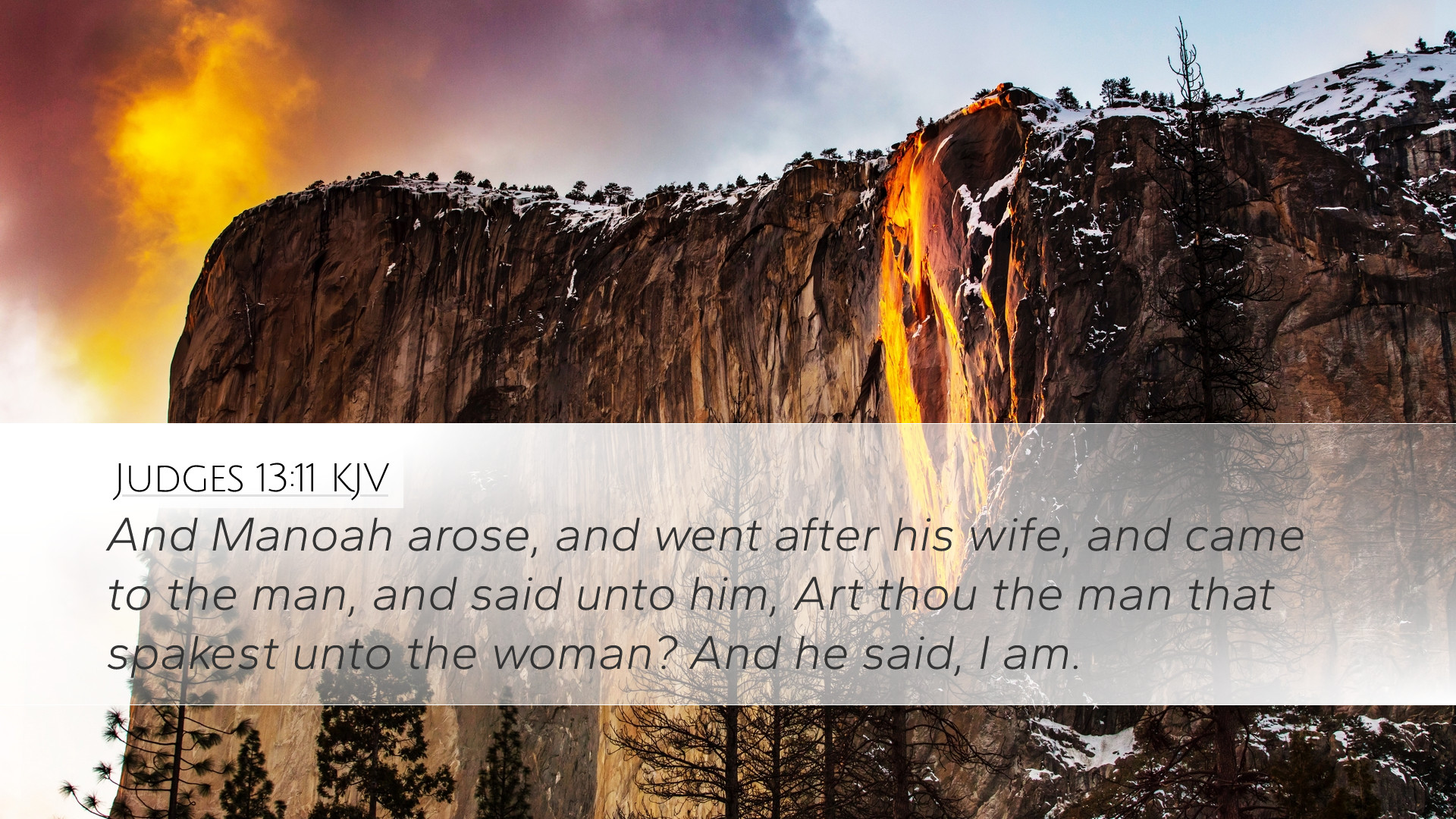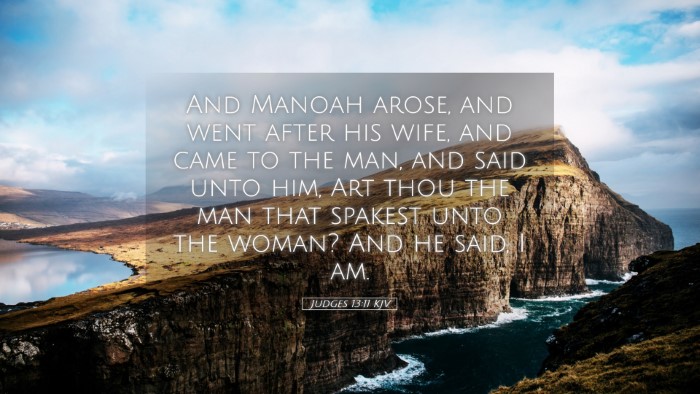Commentary on Judges 13:11
Text of the Verse: "And Manoah arose and went after his wife, and came to the man, and said unto him, Art thou the man that spakest unto the woman? And he said, I am."
Overview
The passage in Judges 13:11 marks a significant moment in the narrative of the birth of Samson, one of the judges of Israel. This verse illustrates the interaction between Manoah, Samson's father, and the angel of the Lord, who had previously revealed divine plans to his wife. This commentary seeks to elucidate the various dimensions presented in this verse, including the themes of divine revelation, faith, and the roles of parents in God's plan.
Insights from Commentators
Matthew Henry's Commentary
- Expectation and Investigation: Manoah’s decision to follow after his wife highlights the significance of familial relationships in spiritual matters. Manoah, intrigued and uplifted by the report of his wife, demonstrates a proactive approach to spiritual truths, affirming that a wife’s spiritual insights should be valued and investigated.
- The Man of God: Henry emphasizes the awe and reverence that accompanies encounters with divine messengers. Manoah’s inquiry, “Art thou the man?” reflects a recognition of the gravity of God’s communication and an earnest desire to understand the implications of the message for their lives.
- Divine Affirmation: The angel's response, “I am,” signifies not just affirmation but the encapsulation of the covenant promise and the assurance of God’s presence. This declaration echoes throughout Scripture, reminding believers of God’s consistent and faithful presence in their lives.
Albert Barnes' Notes on the Bible
- Manoah's Role: Barnes points out that Manoah’s action to approach the man of God indicates his role as a father and leader, eager to ensure that God's will is understood and embraced within his household. His proactive nature reflects a commendable trait of leadership in spiritual matters.
- Questioning as a Sign of Faith: The inquiry posed by Manoah is an exhibit of faith seeking understanding. Barnes opines that questioning in the presence of divine truth is not a sign of doubt but of a sincere desire to align oneself with God’s purposes.
Adam Clarke's Commentary
- The Importance of Divine Messages: Clarke underscores the pivotal role of divine communication in shaping human action. Manoah's approach to the angel signifies the importance of receiving God’s messages with gravity and respect, and understanding the responsibilities that come with them.
- The Nature of God’s Messenger: Clarke elaborates on the identity of the angel as a theophany, representing God's direct intervention in human affairs. The phrase “I am” suggests that the divine often engages with humanity in a personally transformative manner, calling them to fulfill specific purposes.
- Faith in Action: Clarke continues by illustrating that Manoah's willingness to seek out the angel highlights the interplay between faith and action. This embodies a model for spiritual pursuit where believers actively engage with God’s revelations and remain responsive to His call.
Theological Implications
The interactions in Judges 13:11 present profound theological themes that resonate throughout the Bible and are applicable to contemporary Christian faith.
1. Divine Calling
The calling of Samson is a reminder of God's sovereignty in selecting individuals for His plans. Every believer is called to fulfill a unique purpose, and there is a divine ordination in the roles assigned to individuals within the larger narrative of salvation history.
2. Role of Parents
Manoah’s actions underscore the critical role of parents in guiding their children according to God’s purpose. Spiritual leaders in the family context must be vigilant, nurturing faith, and seeking understanding of God’s will for their families. This serves as vital encouragement for parents today.
3. The Nature of Faith
Faith as an active pursuit is a prevalent theme in this passage. Manoah’s steps towards understanding God's message exemplify the essence of faith that seeks knowledge and commitment. This pursuit is a vital component of spiritual growth and maturity within Christian communities.
Practical Applications
From the themes and insights derived from the commentary, practical implications arise for congregations and individuals seeking to apply the lessons of this scripture:
- Encouraging Inquiry: Church leaders should cultivate an atmosphere where questioning and seeking understanding is welcomed, fostering deeper engagement with Scripture and God’s plans.
- Supporting Family Units: Ministries should focus on equipping families to understand their roles in God’s divine narrative, encouraging a collaborative approach to faith within the household.
- Faith in Action: Believers are called to respond actively to God’s revelations, ensuring that their faith manifests in intentional actions that align with His purposes.
Conclusion
Judges 13:11 invites profound reflection on the essence of divine communication, the responsibilities of parenthood in faith, and the nature of active faith in the face of revelation. Drawing from the insights of esteemed commentators, this verse serves as both a reminder and a challenge to engage seriously with the divine messages conveyed to us, ensuring that we, like Manoah, stand ready to pursue God’s calling in our lives and the lives of our families.


